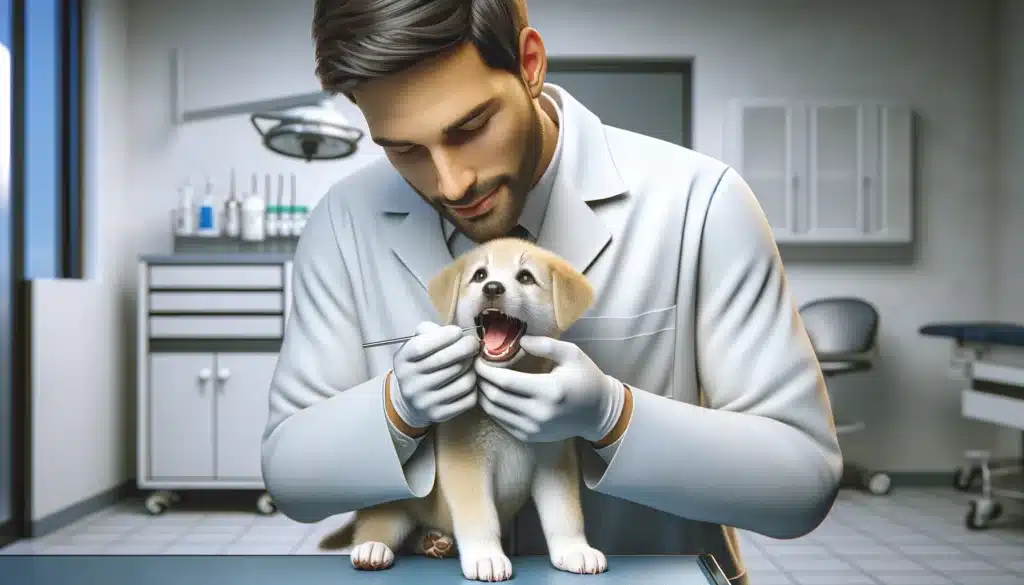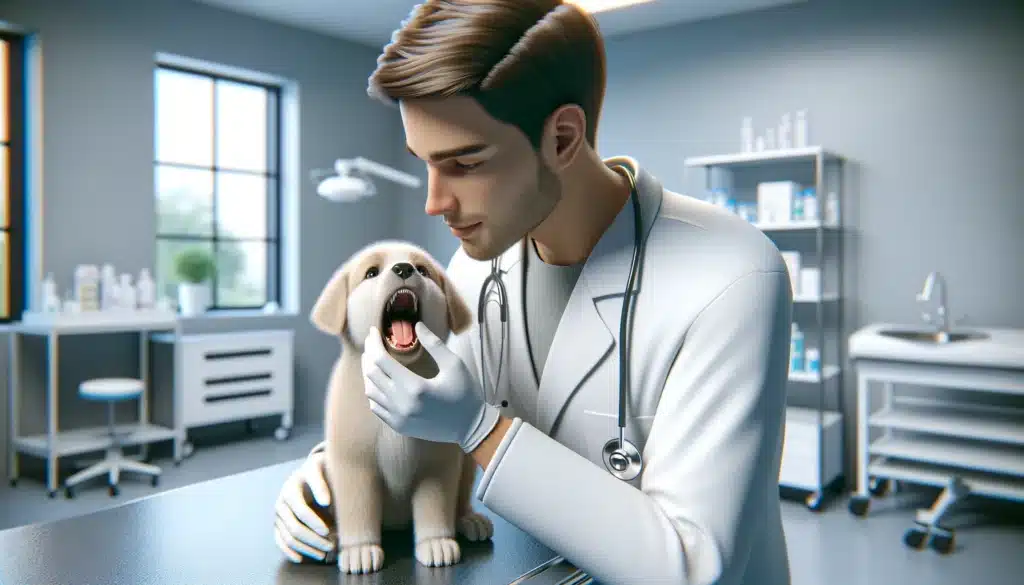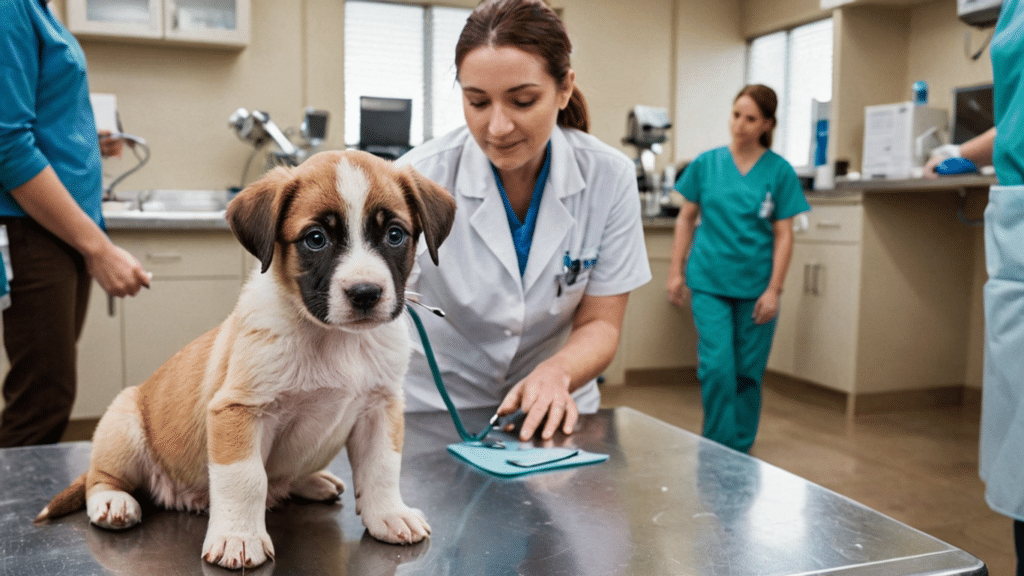Your furry friend can encounter many painful and potentially serious dental issues without proper dental care. As a responsible pet owner, prioritizing puppy dental care is crucial. Healthy teeth are essential for your puppy’s chewing, playing, and overall well-being. From understanding the teething process to battling plaque, this blog post will teach you how to keep your pup’s smile happy and healthy.Understanding Puppy Teeth.

Key Takeaways:
- Early and consistent dental care is crucial for your puppy’s lifetime of healthy smiles.
- Ignoring puppy dental care can lead to painful dental diseases and negatively impact their overall health.
- Regular tooth brushing is the most effective way to prevent plaque and tartar buildup on your puppy’s teeth.
- Dental chews and toys provide a fun and satisfying way to promote healthy gums and teeth in puppies.
- Professional dental cleanings are essential for removing tartar buildup and catching dental problems early.
- Understanding your puppy’s breed-specific dental risks helps you provide tailored preventive care.
Understanding Puppy Teeth
Just like human babies, puppies undergo significant dental changes in their early months. Understanding their unique dental anatomy and growth processes is vital to ensure optimal puppy dental care.
Types of Teeth and Their Functions
Puppies have a set of 28 deciduous teeth, also known as baby or milk teeth. These include:
- Incisors: Small, sharp teeth in the front for grasping and nibbling.
- Canines: Long, pointed teeth used for tearing and gripping.
- Premolars: Larger teeth behind the canines for shearing and grinding food.
Teething Process in Puppies
The teething process typically follows this timeline:
- 3-6 weeks: Deciduous teeth begin to emerge.
- 12-16 weeks: Puppies start losing their baby teeth as permanent teeth push through the gums.
- 6-8 months: Most puppies should have 42 permanent teeth by this stage.
The teething process can cause discomfort and chewing tendencies, so providing appropriate toys is essential – more on this later!

Signs of Dental Problems in Puppies
Early detection is crucial to prevent dental problems from escalating in your puppy. Keep a watchful eye for these common signs:
Bad Breath
Persistent bad breath, beyond normal puppy breath, often indicates a buildup of bacteria and food particles in the mouth. This is a primary sign of dental issues.
Difficulty Chewing
If your puppy shows signs of pain or hesitation while eating, this could point toward tooth sensitivity, infections, or loose teeth.
Bleeding Gums
Red, swollen, or bleeding gums are signs of inflammation and can be a warning sign of gingivitis or more serious periodontal disease.
Other Signs to Watch Out For
- Excessive drooling
- Pawing at the mouth
- Loss of appetite
- Discolored or loose teeth
If you notice any of these symptoms, you should schedule an appointment with your veterinarian for a proper diagnosis and treatment plan.
Preventive Dental Care for Puppies
Proactive dental care is the correct approach to prevent painful and expensive dental problems down the road. Here’s a breakdown of essential practices:
Regular Brushing
Just like humans, puppies benefit tremendously from regular toothbrushing. Aim to brush your puppy’s teeth daily or at least a few times a week. Here’s how:
- Choose puppy-specific toothpaste: Never use human toothpaste – it can be toxic to dogs.
- Use a soft-bristled toothbrush: Opt for a toothbrush for puppies or a finger brush.
- Be gentle: Start with short sessions, gradually increasing the duration. Focus on the outer surfaces of the teeth.
- Make it positive: Use praise and treats to create a positive association.
Dental Chews and Toys
Specially formulated dental chews and toys are excellent for scraping away plaque and tartar while satisfying your puppy’s natural urge to chew. Choose size-appropriate chews to prevent choking hazards. Look for products recommended by your veterinarian or those with the Veterinary Oral Health Council (VOHC) seal of approval.
Professional Cleanings
Your veterinarian may recommend periodic professional dental cleanings, especially if your puppy shows early signs of dental disease. These cleanings, performed under anesthesia, involve a thorough examination, scaling, polishing, and sometimes X-rays for a complete assessment of your pup’s oral health.
Choosing the Right Dental Products for Your Puppy
Navigating the world of puppy dental care products can be overwhelming. Here’s how to ensure you’re making the right choices:
Toothbrushes and Toothpaste
- Puppy-specific: Choose toothbrushes and toothpaste designed specifically for puppies. These typically have softer bristles and are flavored to make brushing more appealing.
- Safety: Look for toothpaste without xylitol (toxic to dogs), fluoride, and excessive additives.
- Veterinarian recommendations: Your vet can provide excellent guidance on safe and effective products tailored to your puppy’s needs.
Dental Chews and Treats
- Quality Ingredients: Opt for chews and treats made with natural, healthy ingredients and avoid artificial colors, flavors, and preservatives.
- VOHC seal: Products with the Veterinary Oral Health Council (VOHC) seal of approval have undergone testing for their effectiveness in reducing plaque and tartar.
- Size and texture: Choose the right size and hardness of chews to suit your puppy’s size and chewing strength.
Always supervise your puppy with dental chews and toys to prevent choking hazards.
Common Dental Issues in Puppies
Despite preventive efforts, puppies can still develop dental problems. Awareness of common issues will help you spot them early and seek appropriate treatment.
Plaque and Tartar
- Plaque: A sticky film of bacteria constantly forming on teeth.
- Tartar: Hardened plaque that requires professional cleaning for removal.
Both plaque and tartar irritate the gums and contribute to further dental problems.
Gingivitis
Gingivitis is an inflammation of the gums. Signs include redness, swelling, and bleeding. If left untreated, it can progress to more serious periodontal disease.
Periodontal Disease
This infection affects the gums, supporting tissues, and bones around the teeth. In severe cases, it can lead to tooth loss, jaw fractures, and even infections that spread to other organs.
Early diagnosis and treatment are crucial for managing dental issues and preventing complications. Consult your veterinarian immediately if you notice dental problems in your puppy.
Diet and Nutrition for Healthy Puppy Teeth
What your puppy eats directly influences their dental wellbeing. Here’s why a balanced diet matters, plus what types of foods to avoid.
Importance of a Balanced Diet
- Strong Jaw Development: A nutritious, balanced diet provides essential minerals like calcium for healthy growth.
- Reduced Plaque Buildup: Some dry kibbles are formulated to scrub teeth, helping to minimize plaque mechanically.
- Immune Support: Good nutrition strengthens the immune system, fighting infections, such as those causing gum disease.
Foods to Avoid
- Sugary Treats: Limit sugary human snacks. These promote bacteria growth and cavities.
- Sticky Foods: Soft, sticky foods easily get caught between teeth, increasing decay risk.
- Table Scraps: Feeding table scraps can lead to nutritional imbalances and excessive amounts of unhealthy fats or sugars.
- Raw Bones: While they seem natural, hard bones can crack teeth and cause choking hazards.
Tips
- Choose high-quality puppy food: Look for age-appropriate formulas with balanced nutrition.
- Consider dental diets: Consult your vet about exceptional food formulated to promote dental health.
- Freshwater: Fresh water is vital for oral health, aiding saliva production to wash away food debris.
Professional Dental Care for Puppies
Regular veterinary checkups and cleanings are critical in maintaining your puppy’s dental health and overall wellbeing.

Regular Checkups
- Early detection: Your veterinarian can identify developing dental problems before they become serious. Early intervention saves your pup’s pain and prevents complex procedures.
- Risk assessment: Routine checkups allow your vet to tailor a dental care plan based on your puppy’s breed, age, and individual needs.
- Professional advice: Access guidance on the top brushing techniques, suitable dental products, and any special dietary considerations.
Dental Cleaning Procedures
Professional dental cleanings involve:
- Anesthesia: This ensures a thorough examination, cleaning, and any necessary procedures are done safely and without causing your pup stress.
- Scaling: The veterinarian carefully removes tartar buildup above and below the gum line.
- Polishing: Smoothing the tooth surfaces makes it harder for plaque to cling.
- Dental X-rays: These might be required to check for hidden problems like tooth root abscesses or fractures.
- Additional treatments: Extractions or other interventions may be needed if dental disease is present.
Frequency: Your veterinarian will determine the ideal frequency for dental cleanings based on your puppy’s needs.
Home Dental Care Tips
Consistent home care is the key to keeping your puppy’s teeth and gums healthy between professional cleanings. Here are some effective techniques and additional considerations:
Brushing Techniques
- Gradual introduction: Start slowly to help your puppy feel comfortable. Begin by letting them lick the toothpaste for familiarity. Then, gently touch their teeth and gums with your finger. Progress to a finger brush and, finally, to a soft-bristled, puppy-specific toothbrush.
- Angled approach: Position the brush at a 45-degree angle toward the gum line. Use gentle circular motions, focusing on the outer surfaces of the teeth – where plaque is most likely to build up.
- Positive reinforcement: Make brushing a positive experience with praise and treats. Go slow, introduce the process gradually, and make it fun!
Dental Rinses and Water Additives
- Veterinary recommendations: Always speak to your vet before using dental rinses or additives for your puppy. They’ll guide you to safe and effective products.
- Additional Protection: These products can provide an extra layer of defense, further reducing harmful bacteria, freshening breath, and promoting oral health.
- Not a Substitute: Dental rinses and water additives are excellent supplements, but they must replace the importance of regular brushing and professional cleanings.
Additional Tips:
- Regular Inspections: Get in the habit of checking your puppy’s mouth regularly. Look for broken teeth, bad breath, red gums, or unusual lumps or bumps.
- Safe Chew Toys: Offer a variety of durable, puppy-friendly chew toys to help naturally dislodge food particles and massage their gums.
The Role of Genetics in Puppy Dental Health
While good dental care practices are essential for all pups, it’s important to understand that genetics can significantly influence your puppy’s dental health. Here’s why:
Breed-Specific Dental Issues
- Small breeds: Toy and small breed dogs often have smaller mouths, leading to overcrowding of teeth. This crowded environment creates prime conditions for plaque and tartar buildup, which can lead to gum disease and tooth decay. They are also more likely to retain deciduous (baby) teeth, increasing complications.
- Brachycephalic breeds: Short-faced breeds like Bulldogs, Pugs, and Boxers frequently have misaligned teeth due to their unique skull shape. This misalignment can cause excessive wear, difficulty chewing, and a greater risk of periodontal disease.
- Specific Predispositions: Certain breeds have genetic predispositions to unique conditions affecting their teeth. Some may have enamel defects, making their teeth more susceptible to decay, while others may have genetically predetermined malocclusions (improper bite). Researching breeds known for particular dental risks is essential.
What Can You Do?
- Know Your Breed’s Risks: Familiarize yourself with common dental challenges associated with your puppy’s breed. This awareness helps you anticipate and proactively address potential problems.
- Early Veterinary Partnership: Connect with your veterinarian early in your puppy’s life. They can assess your puppy’s mouth for signs of potential breed-related problems and establish a personalized dental care plan.
- Extra Preventive Care: Pay particular attention to home dental care for breeds with a higher risk of dental issues. This includes meticulous brushing, providing appropriate chew toys, and seeking regular professional cleanings.
- Be Observant: Closely monitor your puppy’s growing teeth and promptly report any concerns to your veterinarian. Although some breeds are more inclined to develop dental problems, it’s not a sure thing.
By understanding the potential risks, being proactive with care, and partnering with your veterinarian, you can optimize your puppy’s dental health regardless of its breed.
Dealing with Teething Puppies
The teething phase can be challenging for both puppies and their owners. Here’s how to manage the discomfort and promote healthy chewing habits:
Soothing Teething Pain
- Frozen treats: Offer frozen carrots, ice cubes, or puppy-safe popsicles for a cold, numbing sensation. Always supervise your puppy while they chew on icy treats.
- Frozen washcloths: Freeze a damp washcloth and give it to your puppy to chew on. This provides a combination of cold relief and an interesting texture.
- Teething gels: Consult your veterinarian about using a safe, puppy-formulated teething gel to numb irritated gums temporarily.
Safe Teething Toys
- Variety is vital: Provide a selection of teething toys with varying textures and hardness to cater to your puppy’s changing preferences and chewing needs.
- Frozen Kongs: Stuff a Kong toy with peanut butter or other puppy-safe treats, then freeze it for a long-lasting and delicious challenge.
- Durable chew toys: Choose sturdy, puppy-appropriate chew toys to withstand your puppy’s gnawing. Opt for materials like nylon or reinforced rubber.
- Supervision is crucial: Always supervise playtime with teething toys. Replace any damaged toys, as small pieces can pose choking hazards.
Additional Tips
- Redirection: Gently redirect your puppy’s chewing from unacceptable objects (shoes, furniture, etc.) to appropriate chew toys.
- Puppy-proof your home: Limit access to tempting items your puppy may try to chew out of curiosity or discomfort.
Training Your Puppy for Dental Care
By using positive reinforcement, you can make brushing and checkups a stress-less bonding experience.
Positive Reinforcement Techniques
- Start early: The sooner you introduce the concept of oral care, the less apprehensive your puppy will be as they grow older.
- Gradual process: Begin in short sessions. Start by letting your puppy sniff and lick the toothpaste. Slowly progress to lifting their lips, touching their teeth, and eventually using a fingerbrush or toothbrush.
- Plenty of praise: Shower your puppy with enthusiastic praise and treats for every step of progress.
- Patience and consistency: Consistent, gentle practices and positive reinforcement will help your puppy become a champ at dental care.
Tips:
- Choose a calm time: Practice brushing after playtime or walking when your puppy is relaxed.
- Make it a game: Turn it into a positive bonding session, incorporating a playful attitude and rewards!
- Seek help if needed: If your puppy has particular difficulty, consult a veterinary behaviorist or dog trainer for additional support.
Don’t underestimate the power of positive training. Dental care can become another enjoyable activity with your beloved puppy with the right approach.
The Connection Between Dental Health and Overall Wellbeing
Maintaining good dental hygiene in your puppy has far-reaching benefits beyond sparkling teeth and fresh breath. Dental health problems can directly contribute to health concerns far beyond the mouth.
Impact on Heart, Kidneys, and Liver
- Bacterial Gateway: The constant bacteria buildup in an unhealthy puppy mouth provides a perfect entry point into the bloodstream. From here, these harmful bacteria can circulate throughout the body, reaching vital organs like the heart, kidneys, and liver.
- Dangerous Infections: In a weakened or susceptible pup, bacteria can cause serious infections. Endocarditis, an inflammation of the heart’s lining, is one such example. Long-term inflammation can also increase the risk of organ disease as your puppy ages.
- Systemic Impacts: Chronic inflammation from dental disease can contribute to numerous health problems. Research increasingly suggests links between poor dental health and conditions like diabetes, joint pain, and some cancers.
Common Misconceptions About Puppy Dental Care
There’s quite a bit of misinformation floating around regarding puppy dental care. Let’s dispel some common myths to ensure you make the top decisions for your pup’s teeth.
Debunking Myths
- Myth 1: “Puppies don’t need professional dental cleanings because they lose their baby teeth.” Truth: Even with the loss of deciduous teeth, puppies can develop plaque and tartar buildup that requires professional removal. Early dental cleaning establishes a healthy foundation for your puppy’s mature teeth.
- Myth 2: “Dry kibble alone is enough to keep a puppy’s teeth clean.” Truth: While some kibbles may help reduce plaque, it’s not enough to entirely prevent tartar buildup. Brushing and other dental care practices are still crucial.
- Myth 3: “Bad breath is normal for puppies.” Truth: While puppies may have ‘puppy breath,’ persistent bad breath is never normal. It often signifies an underlying dental problem.
- Myth 4: “If my puppy doesn’t have visible tartar, their teeth are fine.” Truth: Significant problems can lurk beneath the gum line. Regular veterinary dental exams are vital for catching hidden issues.
- Myth 5: “Dental cleanings performed without Anesthesia are equally effective as those done by a veterinarian.” Truth: Cleanings without Anesthesia only clean the visible tooth surfaces—plaque and tartar lurk under the gum, requiring Anesthesia for safe and thorough removal.
Fact: Proactive dental care at home and regular professional cleanings are highly effective defenses against dental disease for your puppy Don’t let misinformation lead to neglect – a healthy mouth is the key to a healthy life.
Conclusion
Puppy teeth experience significant development early in life with the emergence of their baby and mature teeth.
Proactive preventive measures like brushing teeth, offering dental chews and toys, and regular professional cleanings are the foundation of good dental health.
Early detection and treatment of dental issues can save your pup from pain, prevent severe complications, and safeguard their overall wellbeing.
Consistent dental care is a commitment to your puppy’s happiness, health, and longevity. Following the tips outlined in this blog and working with your veterinarian increases your puppy’s chances for a lifetime of attractive and healthy smiles
Healthy teeth are not a luxury – they are essential to your puppy’s overall wellbeing. Make dental care a priority from the beginning, and enjoy a thriving puppy’s joyful, toothy grin for years to come!
FAQs
Q: When should I start brushing my puppy’s teeth?
A: Start brushing your puppy’s teeth as early as possible, ideally as soon as their baby teeth come in. The sooner you start, the more accustomed your puppy will become to the process.
Q: How often should I brush my puppy’s teeth?
A: Aim to brush your puppy’s teeth daily or at least a few times a week.
Q: What kind of toothbrush and toothpaste should I use for my puppy?
A: Choose a soft-bristled toothbrush designed specifically for puppies and toothpaste formulated for dogs. Never use human toothpaste on your puppy, as it can be harmful.
Q: My puppy has bad breath. Does that mean they have dental problems?
A: Persistent bad breath is often a sign of dental problems but can also indicate other health issues. Scheduling a checkup with your veterinarian is advisable to determine the cause.
Q: At what age does my puppy need a professional dental cleaning?
A: Your veterinarian can provide tailored recommendations, but most puppies benefit from their first professional dental cleaning between six months and one year.

